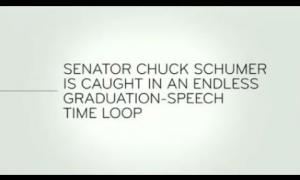Speechwriter goes here
October 04, 2017
Veteran speechwriter Jeff Porro became a novice standup comic—and eventually, a better speechwriter. (You can, too.)
I like to think I’m a funny guy. In my family, I’m the one who gives the witty wedding toasts. As a speechwriter, when I enliven scripts with humor, it seems to work. But I’ve always been afraid to try the next level of funny—stand-up comedy—because I knew that going out in front of strangers and getting laughs is really, really hard.
This year, I decided to face my fears and give stand-up a try. The reason: in January I had a major milestone birthday (let’s just say I’m a baby boomer), and I realized it was now or never.
I told my wife what I was planning to do, and ran some of my best material by her. She was quiet at first, but finally managed to say, “Jeff, honey. Ah … maybe you should try taking a course first, like a course for beginners.”
Point taken.
Luckily for me, Washington, D.C. is home to The Improv, one of the most prestigious comedy clubs in the country. And, the club does offer a course, “Five Minutes to Funny,” which lasts for four weeks. Better yet, it culminates with a show in the Improv’s main room. Every graduating student does a five-minute set on the same stage once graced by Dave Chappelle, Jim Gaffigan, Louis C.K. and many others.
The course was wonderful, taught by a terrific teacher/counselor/guru, Chris Coccia, a Philadelphia comic. Chris’s act is very funny, and he is a wonderful teacher. He knew how to offer each of us absolute beginners just the right blend of support and critique. Moreover, he had this great ability to find the nuggets at the heart of a joke or routine, and suggest ways to polish them into gold.
I started out so frightened I almost fled the first meeting, but wound up loving the class (and even did pretty well at showcase). Stand-up proved even harder and more fun than I’d anticipated. But the biggest surprise was discovering that the craft of stand-up can teach important speechwriting lessons, too. To wit:
Start strong or die!
Every speechwriting pro knows you need a good opening, but sometimes we start with thank you’s, acknowledgements, etc. For a stand-up, the first sentence has to be a grabber, and I’m convinced more speechwriters should strive for that, too.
As a comic the obvious way to grab the audience’s is with a quick joke. Though that’s rarely a good approach for a speechwriter, Coccia pointed out that for both comics and speakers, it’s important to convey right away they know what their listeners are thinking.
A comic might start with a line like, “I know what you’re thinking, `who told him he looked good in that haircut.’” A speech doesn’t have to be that literal, but it should definitely have a reference in the first sentence or two to something that is on the minds of the audience—a stressful business year, an event making local news or a recent trend in the local economy.
Make the audience your pal.
According to Coccia, Jerry Seinfeld says an audience should leave a show feeling that the comic is somebody they’d like to hang out with. A comic’s goal isn’t to win the audience’s love, but to come across as the kind of casual friend you’d meet for a cup of coffee.
I think that’s useful distinction for speechwriters, too. In the back of every audience member’s mind is the question: why should I spend the next 30 minutes listening to this person. If you focus on helping your client come across as friendly and approachable, the speaker will almost certainly keep listeners engaged. Also, it’s a lot easier to win the audience’s friendship than their love.
Cut it out.
The most powerful lesson I learned in comedy class, was also the one with the most relevance to speech writing: cut the crap. Or to put it more elegantly, (and to paraphrase E. B. White): “the best comedy is concise.” Coccia spent hours helping each of us cut out unneeded details, eliminate unnecessary words, and discard lame asides. As Coccia said, “If the joke starts, `A man walks into a bar,” we don’t need to know what kind of car he drove to get there.”
He urged us to re-watch any one of our favorite sitcoms. “You’ll see how lean the writing is,” Coccia said. “Every word serves a purpose. Every sentence either drives a plot point or sets up a punch line.”
That’s the kind of focus and discipline speechwriters should strive for, too. In the best speeches, every story, statistic, quote, and sentence should advance the speaker’s central message. The audience should never wonder, “Why is she talking about that now?”
To be sure, not everything I learned in comedy class was relevant to speechwriting. Stand-up comics don’t ever have to deliver bad news (“we’re cutting a thousand jobs, but a funny thing happened to me driving here…”); and comics don’t have to deliver a vision that inspires people to action.
Nevertheless, give stand-up a try. You may not wind up on Fallon, but I’ll bet you’ll write better speeches.



